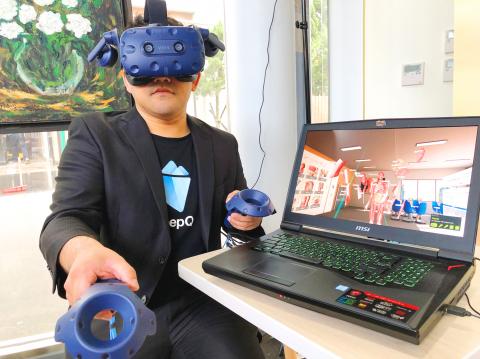Smartphone maker HTC Corp (宏達電) has set its sights on earning an operating license from the Food and Drug Administration to commercialize a new medical virtual-reality (VR) product in the first quarter of next year.
Dubbed Surgical Theater, the VR product could begin to be adopted in clinical use and provide HTC with new revenue streams from the healthcare sector, the company said at a news conference yesterday.
The company also announced that it has sold Taipei Medical University its latest VR offering, 3D Organon, a bundle of 10 Vive Pro VR headsets that provide visualized anatomy information for education.

Photo by Kao Shih-ching, taipei Times
Medical students usually learn human anatomy from 2D models and diagrams in textbooks, or from donated cadavers, which are often in short supply, university Department of Anatomy professor Chang Hung-ming (張宏名) told the Taipei Times.
With the VR teaching system, students can see a computerized simulation that more clearly depicts human anatomy, especially the nervous system, whose components are thin and mostly hidden behind muscles and cavities, Chang said.
A 360o view allows users to see the human body from all angles to better understand how everything is connected, and they can also peel back layers or isolate 4,000 body parts to have a specific view, HTC healthcare division DeepQ director Jerry Cheng (鄭志偉) said.
“Users can even go through the virtual body to have a clear look inside at parts such as the spine and cavities,” he said.
However, it is hard for a VR system to substitute for “silent teachers” (大體老師) — people who have donated their bodies to medical schools — as “students cannot touch or feel the elasticity of muscles in virtual reality,” Chang said.
Besides Taipei Medical University, HTC has also sold 3D Organon to Tri-Service General Hospital and Taipei Municipal Wanfang Hospital, which plan to use the product for shared decisionmaking with patients, Cheng said.
While the firm has begun marketing 3D Organon, which costs about NT$100,000 per unit, HTC said it has also applied for a license for Surgical Theater, which would cost significantly more.
The company has received three medical appliance licenses from the US Food and Drug Administration for Surgical Theater, which provides accurate information that can even be used to help surgeons navigate operations, Cheng said.
As HTC has already conducted clinical trials in the US, it expects to receive approval from the Taiwanese agency by the first quarter of next year, Cheng said, adding that it would market the product to domestic hospitals first and expects to see revenue from the healthcare sector soar.

Intel Corp chief executive officer Lip-Bu Tan (陳立武) is expected to meet with Taiwanese suppliers next month in conjunction with the opening of the Computex Taipei trade show, supply chain sources said on Monday. The visit, the first for Tan to Taiwan since assuming his new post last month, would be aimed at enhancing Intel’s ties with suppliers in Taiwan as he attempts to help turn around the struggling US chipmaker, the sources said. Tan is to hold a banquet to celebrate Intel’s 40-year presence in Taiwan before Computex opens on May 20 and invite dozens of Taiwanese suppliers to exchange views

Application-specific integrated circuit designer Faraday Technology Corp (智原) yesterday said that although revenue this quarter would decline 30 percent from last quarter, it retained its full-year forecast of revenue growth of 100 percent. The company attributed the quarterly drop to a slowdown in customers’ production of chips using Faraday’s advanced packaging technology. The company is still confident about its revenue growth this year, given its strong “design-win” — or the projects it won to help customers design their chips, Faraday president Steve Wang (王國雍) told an online earnings conference. “The design-win this year is better than we expected. We believe we will win

Chizuko Kimura has become the first female sushi chef in the world to win a Michelin star, fulfilling a promise she made to her dying husband to continue his legacy. The 54-year-old Japanese chef regained the Michelin star her late husband, Shunei Kimura, won three years ago for their Sushi Shunei restaurant in Paris. For Shunei Kimura, the star was a dream come true. However, the joy was short-lived. He died from cancer just three months later in June 2022. He was 65. The following year, the restaurant in the heart of Montmartre lost its star rating. Chizuko Kimura insisted that the new star is still down

While China’s leaders use their economic and political might to fight US President Donald Trump’s trade war “to the end,” its army of social media soldiers are embarking on a more humorous campaign online. Trump’s tariff blitz has seen Washington and Beijing impose eye-watering duties on imports from the other, fanning a standoff between the economic superpowers that has sparked global recession fears and sent markets into a tailspin. Trump says his policy is a response to years of being “ripped off” by other countries and aims to bring manufacturing to the US, forcing companies to employ US workers. However, China’s online warriors